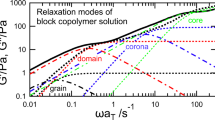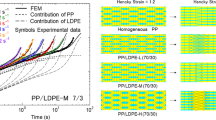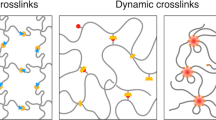Abstract
THE behaviour of melts of styrene–butadiene–styrene (SBS) triblock copolymer under oscillatory shear exhibits a marked departure from that of homopolymers in the low frequency range; the dynamic viscosity η′(ω) increases continually with decreasing frequency, rather than exhibiting the Newtonian limiting value η0 expected of true fluids1. This peculiar behaviour has been explained in terms of phase separation which forms a lattice of linked polystyrene domains. Here we present rheological evidence directly demonstrating a thermodynamic transition.
This is a preview of subscription content, access via your institution
Access options
Subscribe to this journal
Receive 51 print issues and online access
$199.00 per year
only $3.90 per issue
Buy this article
- Purchase on Springer Link
- Instant access to full article PDF
Prices may be subject to local taxes which are calculated during checkout
Similar content being viewed by others
References
Arnold, K. R., and Meier, D. J., J. appl. Polym. Sci., 14, 427 (1970).
Leary, D. F., and Williams, M. C., J. Polym. Sci. (Polym. Phys. Ed.), 11, 345 (1973); ibid., 12, 265 (1974).
Paul, D. R., St. Lawrence, J. E., and Troell, J. H., Polym. engng Sci., 10, 70 (1970).
Pico, E. R., thesis, Univ. California, Berkeley (1976).
Author information
Authors and Affiliations
Rights and permissions
About this article
Cite this article
Pico, E., WILLIAMS, M. Viscosity in the phase transition region of triblock copolymer systems. Nature 259, 388–389 (1976). https://doi.org/10.1038/259388a0
Received:
Accepted:
Issue Date:
DOI: https://doi.org/10.1038/259388a0
Comments
By submitting a comment you agree to abide by our Terms and Community Guidelines. If you find something abusive or that does not comply with our terms or guidelines please flag it as inappropriate.



